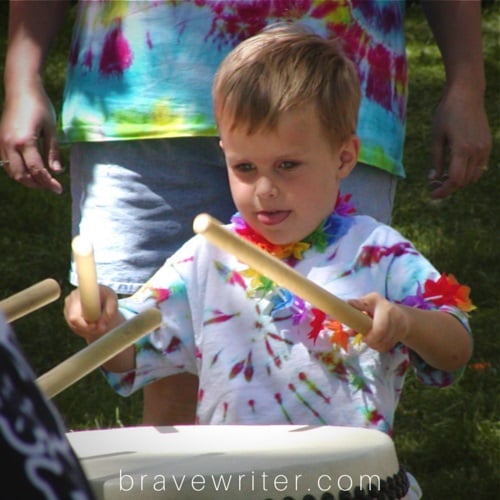Last year we took the WONDERFUL copywork/dictation class and now we are slowly working our way through The Writer’s Jungle. Today my children did their first keen observation exercises.
Samuel, age 8, dictated the following to me with just a little bit of help:
Lightsaber
———-
It has a light-blue blade with streaks of white on it. It has a red button that you pull down to open it. It has six grips on it. One has a little, tiny, white streak on it. In the back of it, it has a knob with ridges going all around it with a dot the color of bronze in the middle of it. Right above that there is this thing that looks kind of like a little clothespin but you can not close it. And it has some black on the rim of it.
On each side of the lightsaber, it has two little bumps with a circle going around it. Above the red button I told you about there is a little silver circle. Above that is a black strip that curves in a moon shape, going out to the sides. On the sides, there is a hump that goes up, around the back, and back down on the other side. Then in the middle of the handle, there is more than 55 tiny, pointy studs going around the middle. It feels a little sharpish but it has a good grip.
It tastes like stale crackers.
In the middle of the left side of the lightsaber, there is a rectangle that goes a half-inch off the side of the lightsaber. On the top of that, there is a gold line about half-inch wide and two inches long and it has perpendicular and parallell lines carved on it and it has two little black spots on the top. And on the side of that rectangle, there is this little thing coming off of it that looks like a bed and it has a black spot at one tip. At the bottom of it, near the grip, is a black hook so you could hook it on your pants.
When the blade is coming out, it sounds like a fast-moving river. When it is going back in, it sounds like a brief drum roll.
The smell is like perfume. That’s why I don’t smell it that much.
———————————–
Jane, 10 years old, wrote the following all by herself about a large multi-colored fake gemstone. (I corrected all of her spelling a punctuation errors as I typed this in):
This fake diamond is an amazing mix of colors. When I lean my head to one side, the sun relects on the little, triangular, tinted plates, creating a rose-blended lavendar, while some still remain an emerald green. The diamond-shaped, colored plates surrounding the outer edge can appear gold in some forms of lighting or lavendar, and in other cases emerald color. The inner plate can, too, appear a most majestic gold. Once I turn on the light the colors become deeper and darker like a dark, deep sea.
It feels cold to the touch, like icy metal. But it warms slowly as you keep your hand on it. The back is coated with a light metal surface.
It smells like a clear icy morning, so clear and airy almost like nothing. When I rub it on a wood surface, it sounds rocky and raspy like a not-so-clear voice coming over an old-fashioned radio. Sometimes when I touch it with a warm hand, it feels sweaty, the way it does when you grip a penny too hard and too long.
In the front there is a flat, circular, clearish plate, which is surrounded by the diamond plates I told you about. I think it is very complex and interesting to think about.
——————————-
I’m pleased with their results. We’ve read good books & they’ve done narration for many years. For the past year, we’ve done copywork, dictation & freewriting regularly. We just completed the Farmer Boy Arrow that caused us to discuss and notice descriptive details, especially for my daughter. We also recently played the communication game, which really helped my son notice & describe details. I think all those things helped prepare them for this valuable exercise. I LOVE this approach to language arts! It’s so natural, fun & productive, too.
–Betsy R



















